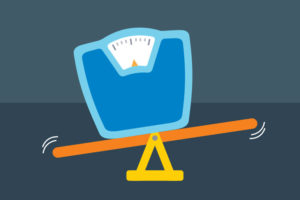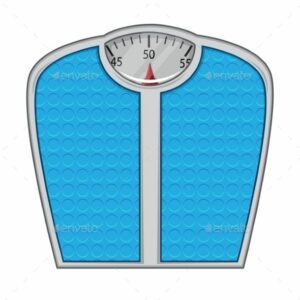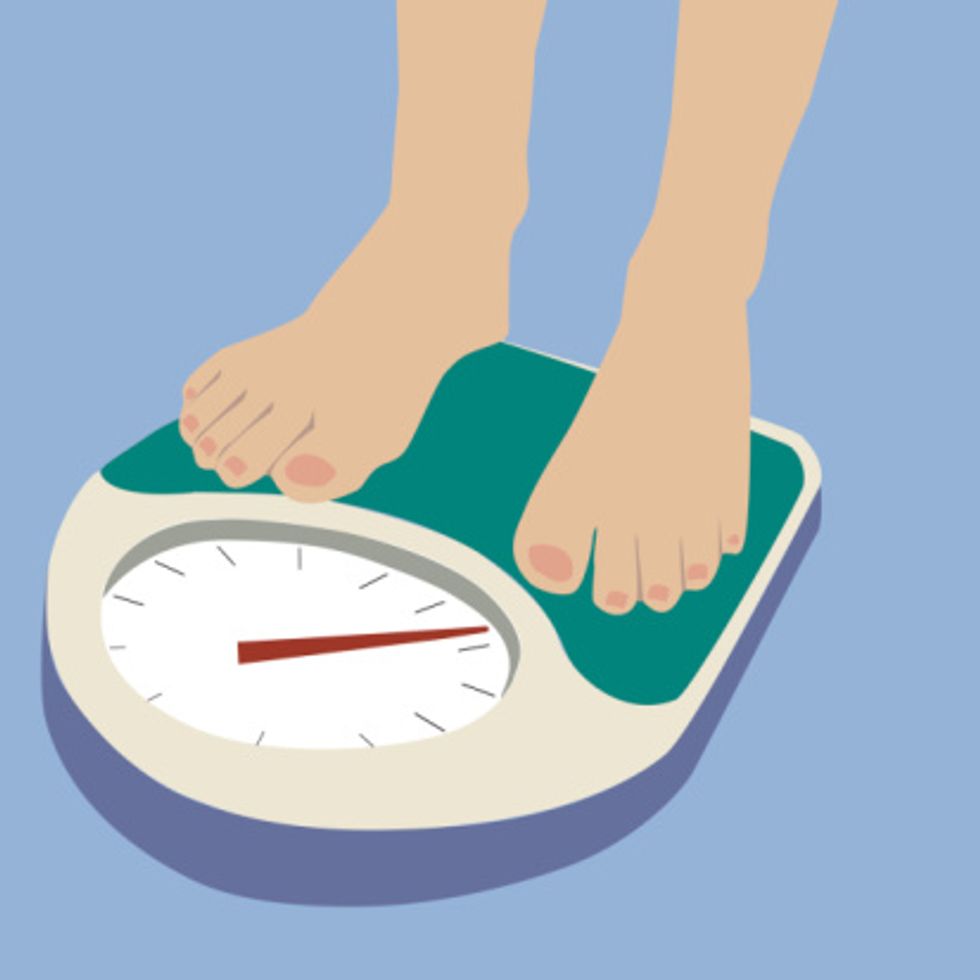It’s perfectly natural to experience temporary weight fluctuations. Whether you’re celebrating a birthday, enjoying a holiday feast, or just dealing with the everyday ups and downs of life, it’s normal for your weight to go up and down. But if you’re struggling with significant changes in your weight that seem to be unrelated to anything in your life, it can be really frustrating. In this blog post, we’ll talk about what causes weight fluctuation and how you can deal with it effectively.
Contents
What Does Weight Fluctuation Mean?
 Weight fluctuation means that your weight goes up and down over time. It is basically an irregular weight change. Most people fluctuate within a few pounds of their ideal body weight. However, some people may see larger fluctuations due to factors such as eating habits, stress levels, exercise habits, and more.
Weight fluctuation means that your weight goes up and down over time. It is basically an irregular weight change. Most people fluctuate within a few pounds of their ideal body weight. However, some people may see larger fluctuations due to factors such as eating habits, stress levels, exercise habits, and more.
If you’re trying to lose weight, weight fluctuation can be frustrating. You may feel like you’re not making progress if your weight goes up even after you’ve been sticking to your diet and exercise plan. However, it’s important to remember that weight fluctuation is normal.
There are studies that found that people who weigh themselves daily are more likely to lose weight and keep it off. This is because they are more aware of their weight and can make necessary changes to their diet and exercise plan if they see a gain.
If you’re concerned about weight fluctuation you should consider talking to a doctor or registered dietitian. They can help you determine if your weight gain is due to a medical condition or something else.
What Causes Weight Fluctuation?
The causes of weight fluctuation are different for everyone. Some of these are listed below:
Hormonal changes
Weight fluctuation is all about sudden gaining and loss of water in the body. This happens when your hormones are imbalanced. Also, in women, weight gain or loss can be a symptom of PMS. But yes, hormonal changes are considered one of the major causes of weight fluctuation.
More often, for women during their menstrual cycle, the levels of progesterone and estrogen drop. And this can make you feel bloated and cause weight gain. In fact, studies have suggested that women can gain up to five pounds during their period. However, this is only water weight and you will lose it soon enough.
Changes in diet
 If you’ve been eating clean and healthy all week long and then indulge in a cheat meal or two over the weekend, it’s bound to show on the scale come Monday morning. A sudden change in your diet can cause your weight to fluctuate. This happens because your body is adjusting to the new food you’re eating and the water retention that comes with it. If you’re not used to eating a lot of salt, for example, your body will hold on to more water than usual.
If you’ve been eating clean and healthy all week long and then indulge in a cheat meal or two over the weekend, it’s bound to show on the scale come Monday morning. A sudden change in your diet can cause your weight to fluctuate. This happens because your body is adjusting to the new food you’re eating and the water retention that comes with it. If you’re not used to eating a lot of salt, for example, your body will hold on to more water than usual.
The same goes for sudden changes in exercise. If you’ve been working out regularly and then taking a week or two off, your weight is likely to go up. This is because your body isn’t used to the lack of exercise and starts to hold on to more water.
Sleep deprivation
Lack of sleep can cause an increase in the stress hormone cortisol, which leads to overeating and increased fat storage. Also, when you’re tired, you’re more likely to make poor food choices and crave high-calorie foods.
To get on track, aim for seven to eight hours of sleep per night. If you have trouble falling asleep or staying asleep, try some simple sleep hygiene tips, such as avoiding caffeine in the evening, turning off electronics before bed, and keeping a cool, comfortable bedroom.
Fluid retention
If you’re retaining fluids, you may notice a sudden increase on the scale even though you haven’t changed your eating or exercise habits. Many things can cause fluid retention, such as:
- Taking certain medications, such as birth control pills, non-steroidal anti-inflammatory drugs (NSAIDs), and corticosteroids
- Being pregnant
- Eating salty foods
- PMS
- Standing or sitting for long periods of time
These are some reasons that water retention might be the cause of a weight gain. You need to be aware of these things, only this way you can be on top of your body and know what’s going on.
Stress and mental disorders
 It is often believed that people with mental disorders are more likely to fluctuate in weight. While this may be true for some, it is not always the case. In fact, people of all shapes and sizes can experience weight fluctuations.
It is often believed that people with mental disorders are more likely to fluctuate in weight. While this may be true for some, it is not always the case. In fact, people of all shapes and sizes can experience weight fluctuations.
Stress is one of the most common causes of weight fluctuations. When we are stressed, our bodies release a hormone called cortisol. Cortisol is responsible for many things, one of which is increasing our appetite. This can lead to overeating and weight gain.
Mental disorders can also cause weight fluctuations. Disorders such as anxiety and depression can lead to changes in eating habits. People with these disorders may either overeat or undereat. And that will cause weight fluctuations.
So, if you are experiencing weight fluctuations, then maybe these are the causes. In fact, weight fluctuations are often normal and nothing to worry about. But if you are concerned, then talk to your doctor. They will be able to help you find the cause and develop a plan to fix it.
How to Deal with Weight Fluctuation?
Depending on the cause of your weight fluctuation, there are different things you can do to manage it. In fact, for overall health, it’s important to maintain a healthy weight range, and not yo-yo up and down. Some of these include:
Do not skip meals
Skipping meals is never a good idea, but it can actually cause weight gain. When you skip meals, your body goes into “starvation mode.” This causes your metabolism to slow down and makes it harder for your body to burn calories. So you should focus on eating regularly and not skipping meals.
Moreover, the most important meal is your breakfast. A lot of people think that they should skip breakfast because they’re trying to lose weight. But this is actually the worst thing you can do. Breakfast jump-starts your metabolism and gives you energy for the day.
Change your diet
If you are not eating a balanced diet, this can lead to weight fluctuations. You should focus on eating healthy foods that are nutrient-dense and low in calories. This means eating more fruits, vegetables, lean proteins, and whole grains. And limit processed foods, sugary drinks, and unhealthy fats. Healthy foods should always be your first choice when you’re trying to lose weight.
More often, people mistake thirst for hunger and end up eating when their bodies are actually just craving fluids. So, before you reach for a snack, make sure you’re really hungry by drinking a glass of water and waiting a few minutes. If you’re still feeling hungry after that, then go ahead and eat something healthy.
Keep moving
 This is an essential part of your daily routine whether you’re trying to lose weight, gain weight, or just maintain your current weight. Exercise helps to increase or maintain your lean muscle mass, which in turn helps burn more calories both during and after exercise.
This is an essential part of your daily routine whether you’re trying to lose weight, gain weight, or just maintain your current weight. Exercise helps to increase or maintain your lean muscle mass, which in turn helps burn more calories both during and after exercise.
Find an activity that you enjoy and make it a part of your daily routine. If you enjoy running, try to run a little further or a little faster each day. If you enjoy walking, try adding some hills to your route. The key is to find an activity that you can stick with for the long term.
Accept that weight fluctuation is normal
Don’t get too stressed out about it. Just accept that your weight will go up and down over time. In fact, it’s completely normal to gain and lose a few pounds each year.
What you can do about it:
- First, don’t panic. It’s totally normal to fluctuate a few pounds here and there.
- Second, take a step back and look at the bigger picture. Are you generally happy with your weight? Do you feel healthy?
- Third, focus on the things you can control. You can’t control how much you weigh, but you can control your eating and exercise habits.
- Fourth, be patient. Weight loss is a slow process, and it’s often not linear. Just keep doing your best and trust that the results will eventually show.
These are just a few tips to help you deal with weight fluctuation. Remember, it’s normal and there’s no need to stress out about it.
Keep a journal
Journals are a great way to keep track of your thoughts, feelings, and experiences. When it comes to weight fluctuation, a journal can be an invaluable tool. Use it to track your daily calorie intake, physical activity level, and any changes in your weight. This will help you identify patterns and make necessary adjustments to reach your goal weight.
Another benefit of journaling is that it can help you stay motivated. When you see progress being made, even if it’s slow, it can be a huge motivation booster. This is especially true on those days when you feel like you’re not making any progress at all.
Don’t obsess over the number on the scale
 It’s easy to get fixated on the number on the scale, but it’s important to remember that weight fluctuates day-to-day and even hour-to-hour. A temporary gain or loss is nothing to get worked up about. If you’re concerned about your weight, focus on your eating habits and activity level rather than the number on the scale.
It’s easy to get fixated on the number on the scale, but it’s important to remember that weight fluctuates day-to-day and even hour-to-hour. A temporary gain or loss is nothing to get worked up about. If you’re concerned about your weight, focus on your eating habits and activity level rather than the number on the scale.
More often than not, a slight weight gain is due to water retention, not excess fat. If you’ve been eating salty foods or not drinking enough water, you may notice a temporary increase on the scale.
So, these are some tips through which you can deal with the problem of weight fluctuation. It is essential to remember that your weight should not define you as a person. You are so much more than a number on the scale!
How To Weight Yourself Effectively?
When you are dealing with weight fluctuation, it is important to know how to weigh yourself effectively. There are a few things you need to keep in mind when doing this.
Use scale primarily
This is the most accurate way to measure your weight. When you use a scale, you will be able to get an exact number. In fact, scales that are used in doctors’ offices and hospitals are generally very accurate. Also, using the same scale will give you more consistent results.
Weigh yourself at the same time every day
Your weight can fluctuate throughout the day, so it is important to weigh yourself at the same time every day. This will give you a more accurate picture of your weight. Also, it is said that you should weigh yourself first thing in the morning before you eat or drink anything. In this way, you will get an accurate measurement of your weight.
Wear similar clothing
What you wear can also affect your weight. If you weigh yourself with clothes on, then you will obviously weigh more than if you were naked. So, it is important to wear similar clothing when you are weighing yourself. This way, you will get a more accurate measurement of your weight.
These are the most common ways to effectively weigh yourself. By following these tips, you will be able to get a more accurate measurement of your weight and you will be able to track your progress more effectively.
Also, it is important to weigh yourself during weight fluctuation. Because if you don’t it will be harder to track your progress.
Conclusion
To conclude, weight fluctuation is considered to be a normal part of the weight loss process. Do not get discouraged if you experience a temporary gain or loss in weight. Remember to focus on your long-term goal, and trust that the fluctuations will eventually even out. Implementing healthy lifestyle habits will help to ensure that your weight loss is sustainable in the long run.
However, if you are struggling to manage your weight, it may be helpful to speak to a registered dietitian or certified health coach. They can provide you with individualized guidance and support to help you reach your goals. For this, you can contact Mantra Care.
Mantra Care is a personalized health coaching service that provides comprehensive support for all aspects of your health and wellness journey. Our team of experts will work with you to develop a healthy weight loss plan tailored plan that meets your unique needs and helps you to achieve your goals. Please consult with a dietitian or nutritionist for accurate help and information.


